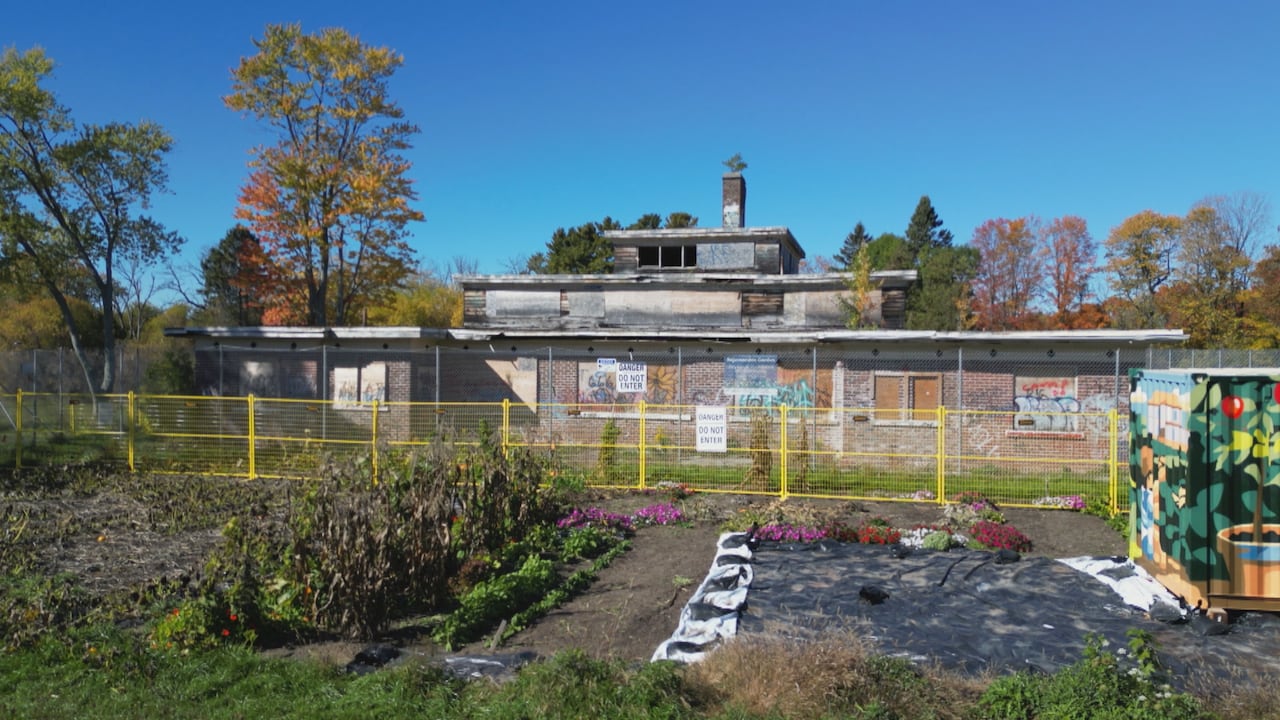Marilyn Morawetz stares at the crumbling walls of a historic cafeteria building, still finding beauty in its prairie-style architecture.
“They’re almost never seen in an industrial kind of setting like this,” she said. “If it goes down, our real fear is that everything will go down and that would be an incredible shame.”
The 100-year-old building closed in 2008 and sits in disrepair alongside five other heritage buildings that once formed Camp 30, on the edge of the Town of Bowmanville, Ont.
The nationally designated historical site served as a reform school for boys when it first opened in the 1920s. During the Second World War, it was converted to house German prisoners of war (PoWs).
“This site had, at its height, 800 PoWs,” Morawetz said.
“When they (the PoWs) had the reunion in 1992, they sat down and had a meal prepared by the school cafeteria that was here and just sort of reminisced about all those things. It was pretty fascinating.”
The cafeteria is where the Battle of Bowmanville took place, a three-day revolt staged by prisoners. It’s considered to be the only Second World War battle on Canadian soil, fought with hockey sticks and pipes, rather than firearms, according to Morawetz.
She chairs the Jury Lands Foundation, a non-profit that oversees preservation of the site. But that could soon come to an end, when Clarington’s council votes on what to do with the cafeteria, its only municipally-owned building.
“It’s a serious crossroads for us,” she said.
“Council is considering demolition and with the current economy, maintaining a property like this safely for the community, especially in this state, it’s a challenge.”
In 2022, Clarington negotiated to take ownership of the cafeteria from Kaitlin Corporation, leaving the remaining heritage buildings and land under the developer’s portfolio.
Initially, it explored full restoration of the site, but learned that would cost over $20 million. Council tasked staff with finding alternatives, which were brought back in June of this year.
The options vary widely in cost, the cheapest of which is demolition.
From camp to community hub
Another option could see Clarington temporarily stabilize the building, making it safer to use for the public.
Doing so would help with necessary upkeep and allow for communal use of the space, according to Morawetz.
“If the building can be stabilized and made safe and secure, it could stand for 20 years without any further investments,” she added. “But in the meantime, if it was useful to community groups, it would be serving a wonderful purpose.”
A garden has already been planted near the cafeteria, which Morawetz said had been used this summer to donate fresh produce to local food banks.

She said other community groups have expressed interest in gathering and using the space for events.
“We’ve all sort of settled on the fact that it would serve the community really well to have a place where people can gather and come together and feel like they have the space to offer the programming that they would like to offer.”
Comes down to ‘dollars and cents’: mayor
Clarington Mayor Adrian Foster isn’t sold on that idea.
While significantly cheaper than a full restoration project, he worries stabilization isn’t viable long-term.
“I think it’s going to come down to dollars and cents,” Foster told CBC News.
“If we can justify a significant amount of money, which would stabilize it for about two years. We would have to revisit, two years from now.”
Foster said he’s in favour of knocking down the cafeteria and replacing it with a replica building.
Doing so, he said, would help to preserve its history without the same challenges and costs associated with renovating the existing structure.
“The stories are more important than the bricks and mortar,” he added.
A new settlement offer
The Jury Lands Foundation is petitioning the municipal council to turn down that option.
Instead, Morawetz said it should look to fund stabilizing the building through community benefits charges, a provincial tool that supports the reuse of historic buildings for public benefit.
She said provincial and federal heritage grants are also available for it to explore.
She also hopes a new offer from the landowners of the existing site will also give councillors room for pause.
The Kaitlin Corp. is offering all the remaining buildings and land back to the municipality, forgoing any future development on the land, in exchange for it to be dedicated for park space.
Doing so would fulfill the developer’s requirement for park space in its nearby development.
It’s also offered to provide some equivalent value in demolition costs, should Clarington choose to restore all buildings on the site.
“This settlement offer represents a significant ‘win’ for the municipality and the members of the community that are desirous of preserving and/or commemorating the cultural heritage of the property,” reads a letter to council on Oct. 3, from the Kaitlin Corp.
Clarington is already struggling to finance the partial preservation of the cafeteria building.
At an Oct. 6 meeting, staff told council that entering into the deal could force the municipality to scrap another nearby park development due to costs associated with both.
But Morawetz believes Clarington councillors will need more time to think about its options, now that the offer is in place.
Council will debate the future of the cafeteria on Monday.






